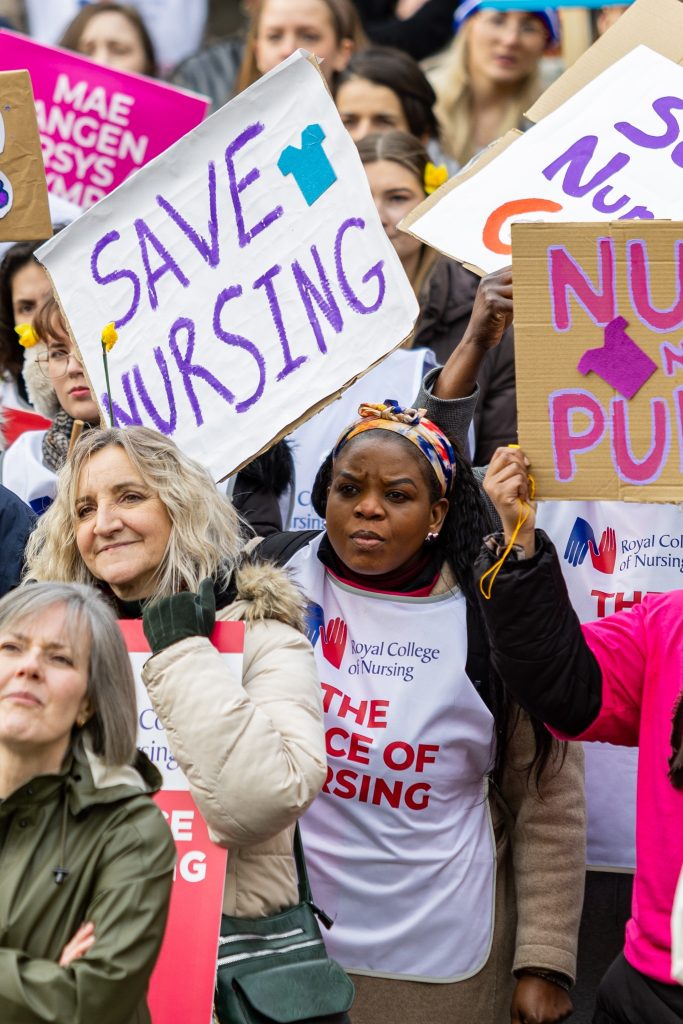The proposal comes as Wales faces a severe nursing shortage, placing pressure on an already overstretched workforce
HUNDREDS of student nurses gathered at the University Hospital of Wales in Cardiff to protest the closure of their prestigious nursing programme.
The proposals by Cardiff University – which could also include axing ancient history, theology and music as well as nursing – are to fill a £31m funding deficit.
The protest on Friday, February 7, followed a similar demonstration by nursing lecturers outside the Senedd which happened on Tuesday.
The proposals have been met with widespread criticism from some staff, students and unions. But the university has said there is no longer an option “to continue as we are” partly due to declining international student applications and increasing cost pressures.
Cerys Keane, 27, is a third year nursing student at Cardiff University, and a member of the Save Nursing group which organised the protest and which is made up of more than 300 student nurses across Wales.
“We want to bring staff and students together in solidarity to show that we won’t go without a fight,” Ms Keane said.
“Anyone who has been treated in hospital or community services will have been treated by a student nurse at some point in their lives. We care for people from cradle to grave in the best of times and the worst of times.
“Nursing is an incredible career, and the value to the very fabric of a functioning society we represent cannot be underestimated.
“But nursing has long since been undervalued and prioritised and if we want a functioning health service, the university executives and the Welsh government must intervene.”
Professor Nicola Ranger, chief executive director of the Royal College of Nursing Wales spoke at the protest and said: “This is an absolute attack on the safety-critical brilliance of nursing, and that is what we are fighting for here today.

“Nursing is still the most vital profession for patients and the public. It is still the absolute lifeblood of any organisation, yet sadly, we are still the least understood and the least valued.
“When you stop students, you ultimately affect the wellbeing of the Welsh population, and this has to stop. We will fight to represent you because we know how vital the nursing school is in Cardiff.
“And let this be a warning, if they can do it in Cardiff, this will be the first of many, and that is our concern.”
Helen Whyley, executive director of RCN said: “Shame on you, Cardiff University. We will not go down without a fight, and the RCN pledges that we will support you, we will help you, we will speak for you, and we will stand together to oppose this diabolical plan.”

Other guest speakers included lecturers of the adult nursing programme at Cardiff University.
Clare Job, who has been a registered nurse since 1995 and who specialises in the field of cancer and palliative care, said: “These proposals send a dangerous message. That nursing education is expendable, cutting nursing education can balance the books, and the health of the people in Wales is negotiable.
“We have a chronic shortage of nurses in Wales, the UK and internationally. We need to be thinking of ways that we can expand nurse education, we certainly shouldn’t be thinking of reducing the number of nursing schools.
“Is there any wonder that recruiting people into nursing is challenging when we see registered nurses needing to fight for fair pay in the NHS, and we see our nursing students having to fight to keep their nursing school?”

Emily Kitt, a lecturer in mental health, learning disabilities and psychosocial care, said: “I stand before you, a girl who grew up on a farm in rural West Wales, who didn’t study at a Russell Group university, and who found that those kinds of institutions were not meant for me.
“Sixteen years later, after dedicating a decade of my career as a mental health nurse working in an underfunded and understaffed ward, I found a community of diverse nurses with a range of life experiences doing their utmost to meet the needs of their patients, and today, I feel uplifted by that same community.
“The diversity we bring forward and the patients we care for is something to be proud of, yet it is currently being attacked, consulted and degraded by an elitist institution which is blatantly disregarding our work.”
Over the next 90 days, Cardiff University with consult with staff before a final decision on the future of the nursing programme is made.



